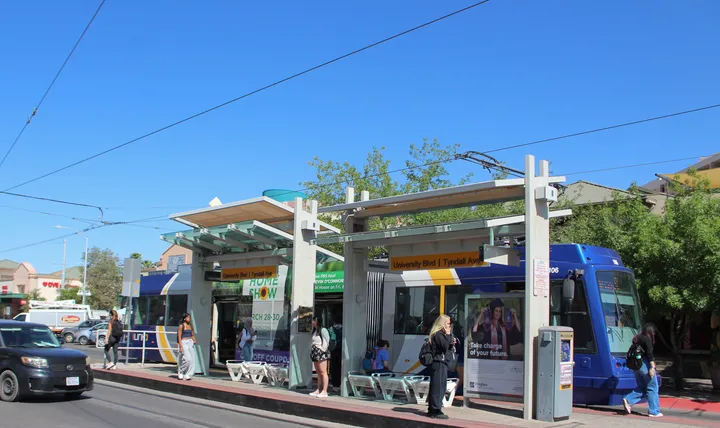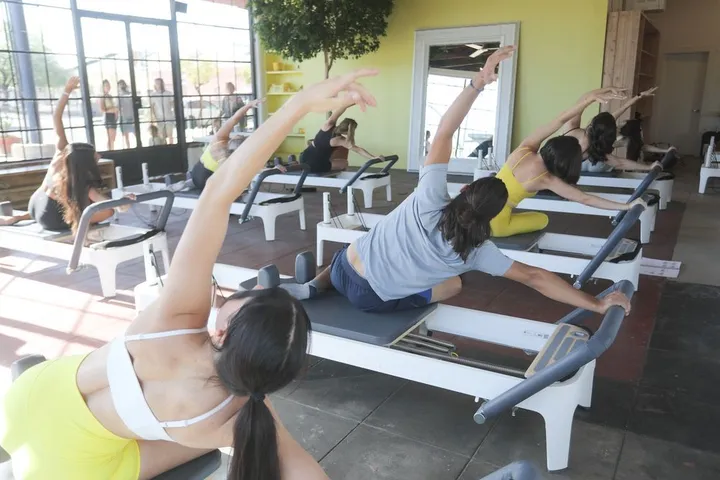Tucson council candidates address policing, homelessness at NAACP forum
Nine Tucson City Council candidates shared their views on homelessness, public safety, city services, and engagement with the Black community during a voter forum hosted by the NAACP.
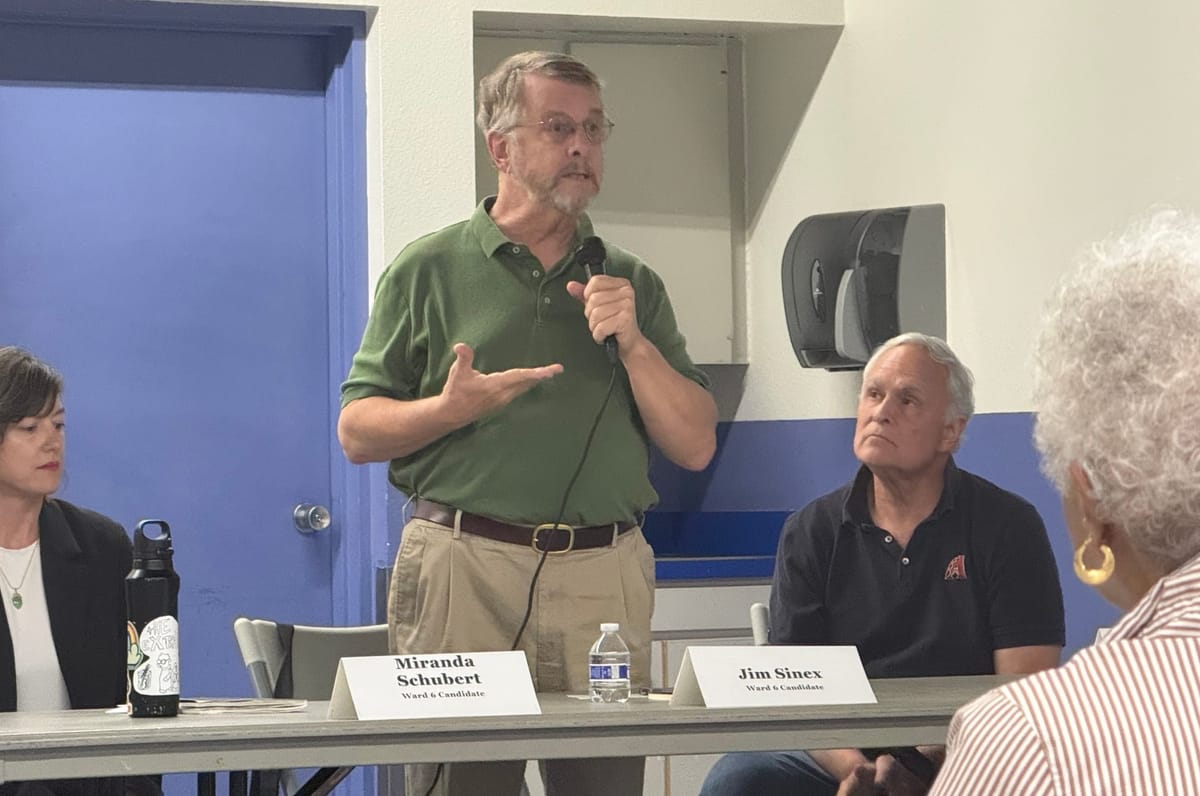
With Tucson’s primary election drawing closer, nine City Council hopefuls packed the Donna Liggins Recreation Center on Thursday night, fielding questions from voters and the NAACP.
Candidates in attendance included Ward 3’s Sadie Shaw and Kevin Dahl; Ward 5’s Selina Barajas, Jesse Lugo and Chris Elsner; and Ward 6 candidates Leighton Rockafellow Jr., Miranda Schubert, James Sinex and Jay Tolkoff, the event's lone Republican.
Ward 6 Democratic candidate Theresa Riel and Ward 3 Republican candidate Janet Wittenbraker did not attend. Each candidate gave a one-minute introduction before fielding questions from moderator and NAACP President Cheree Meeks.
The questions touched on everything from homelessness and public safety to community access and relationships with Tucson’s Black community. Here’s what the candidates had to say:
City resources, services and opportunities
Shaw talked about the need for more oversight of the police department, citing its “huge budget.”
“I think that merits more independent oversight to make sure that the policies, the procedures, and the training for officers is working and that there is no need for adjustment,” said Shaw.
Elsner pointed to the need for more inclusive community engagement and for processes that ensure all voices are heard.
“We hear the squeaky wheels that come to city council meetings,” he said. “We hear the people who have the time and the privilege to show up to community forums, to have time to participate in these things.”
He said many families are left out of the process.
“If you’re a working family, you have several kids, you’re just trying to get food on the table, you do not have time or capacity to participate in these things,” he said. “And I don’t exactly know what the answer is, but we have to find a way to bring their voice with them.”
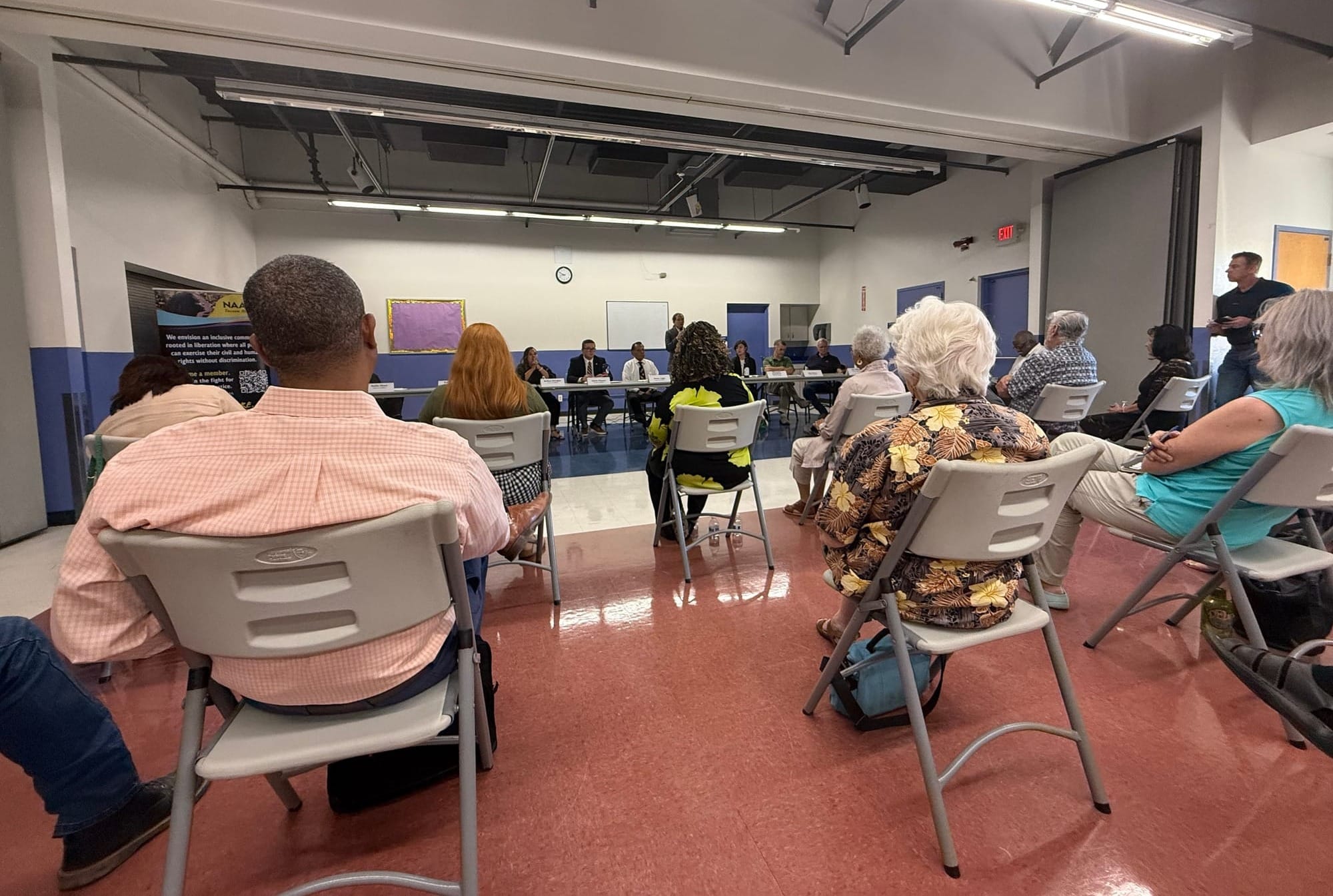
Rockafellow called for the return of town halls to ensure that community voices are heard, pointing to a disconnect between the government and its citizens that he said needs to be addressed.
He said he would begin by listening to residents in his ward and beyond to help better understand where the gaps exist and how to address them.
Schubert referenced her advocacy for fare-free public transit, noting her long-standing involvement in the issue.
“This is something that I’ve been fighting for over the past few years,” she said. “I helped form a Transit for All coalition.”
Relationships with the Black community
Tolkoff talked about his experience growing up in New Jersey, saying that his time as a musician allowed him to work with and be surrounded by people in the Black community.
"I think that what’s necessary here is that we need to start creating our community as a community and not differentiating different groups of people and saying, ‘Oh, this person needs attention, that person needs attention,’” Tolkoff said. “I think that Tucson needs to improve generally, and I think that when we lift up, the whole boat rises — everybody else rises with it.”
He added that if elected to represent Ward 6, he would seek input from community groups.
“I’ll ask for participation from people like the NAACP and get people’s ideas so we can identify what they’re actually seeing — and with that, we can look at some solutions,” he said.
While Lugo talked about his plans for staffing in the Ward 5 office, he did not directly mention his relationship with or plans to work with the Black community.
Current Ward 3 Council Member Dahl highlighted his efforts to support the Black community since being elected in 2021, talking about his staff’s visit to the African American Museum of Southern Arizona, its inclusion in their newsletter and a financial contribution to the museum.
He also noted that Ward 3 has consistently had an African American staff member and added that, over the past year, his office began providing financial support for Tucson’s Juneteenth celebration.
Shaw said that as the only Black candidate, she does not speak for all people in the Black community. Drawing on her role as a neighborhood advocate for Sugar Hill, she discussed her ongoing efforts to raise awareness and visibility for the historically Black neighborhood.
One example she highlighted was her involvement in the renaming of a local park, now known as Doris J. Thompson Park.
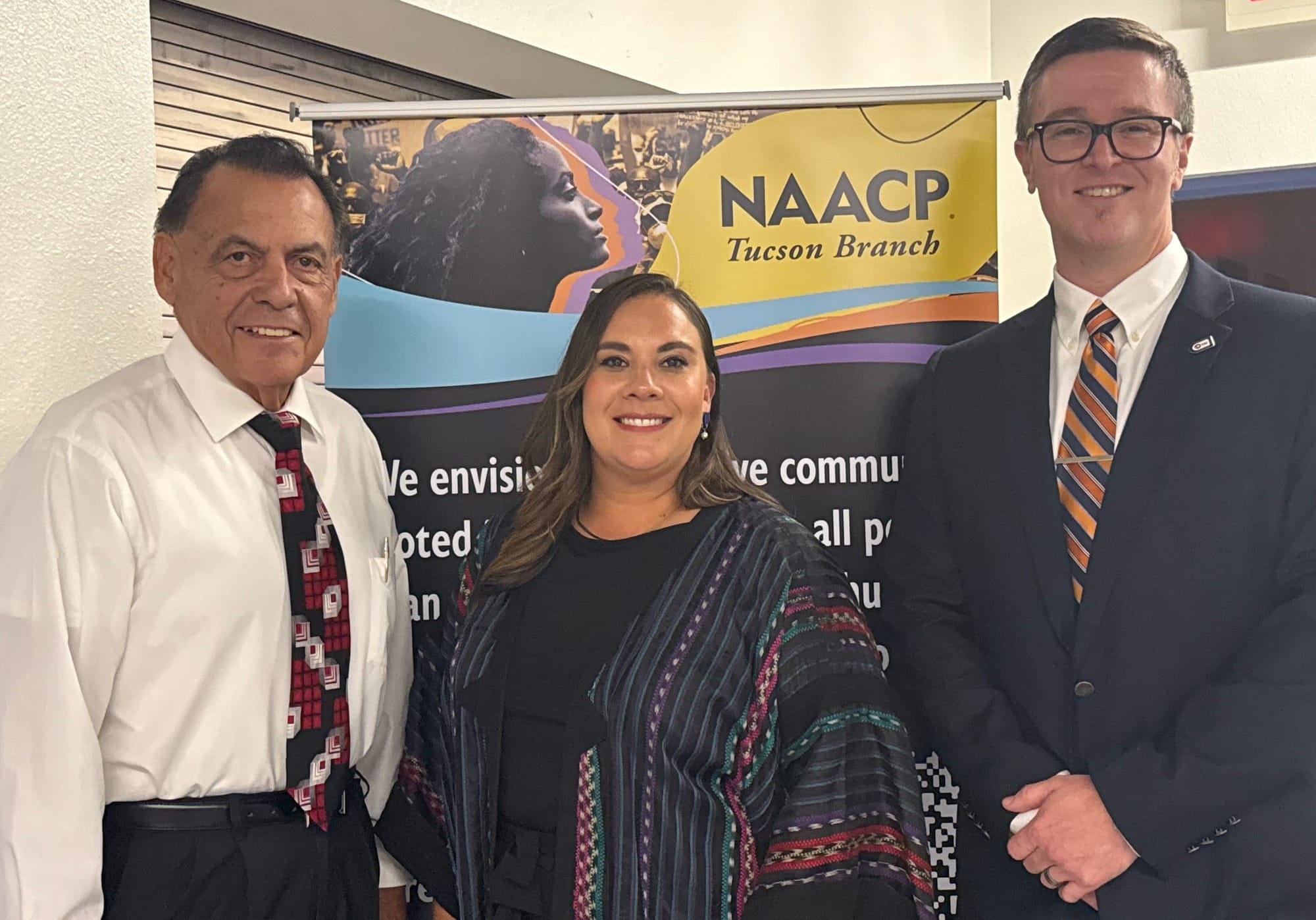
Mass deportations
All the candidates agreed that the issue falls under federal jurisdiction and noted that the mayor and council have already directed the city not to take action on it. They said they would continue to support that directive.
Several candidates, including Dahl, Lugo and Tolkoff, also agreed that the Tucson Police Department lacks the personnel and resources to take on responsibilities that belong to federal agencies.
Helping the homeless
Tolkoff said homelessness is a complex issue that can’t be solved with a one-size-fits-all approach. The city needs to look at individual cases and evaluate each person’s needs.
One solution he endorsed was the Transition Center at the Pima County Jail, saying it had “very good results.” However, Tolkoff failed to mention that this program is currently focused only on helping those being released from jail — not the broader homeless population.
“I have friends who have children who are homeless because they choose to be homeless,” he said.
Sinex said it’s important to understand the difference between “homeless” and “houseless,” explaining that he had previously been houseless for about three weeks. While he had a tent and a job, he needed some assistance to get back on his feet. He did not elaborate on what assistance he received, but instead talked about tiny homes as a solution.
“There are some nonprofit organizations right here talking about building tiny houses, temporary structures, not really something you want to move into forever,” he said. “One of the benefits of our trade deficit is that shipping containers are really cheap.”
Schubert floated the option of increasing the bed tax at Tucson’s hotels so more money could be put back into the government and used for community needs.
“I think there are so many possibilities when it comes to the city potentially entering into partnerships to tackle different variables around the strategic plan, such as the Prosperity Initiative,” she said.
Lugo proposed the idea of a hub that provides services to the homeless to help get them back on their feet, highlighting the H.S. Lopez Family Foundation Center of Opportunity as a “perfect example” of where people can go to find housing, food and education.
“Recently, I've been on bus routes 16, 18, 25 and 7, and I've personally gotten on a bus with the homeless,” Lugo said. “If you want to see the challenge there because of the homeless people that actually take the majority of the seating, make sure you take some nose spray with you because you’re going to get a whiff of something.”
Lugo referred to homelessness as a health condition and called for the community to come up with a resolution to get people the help they need.
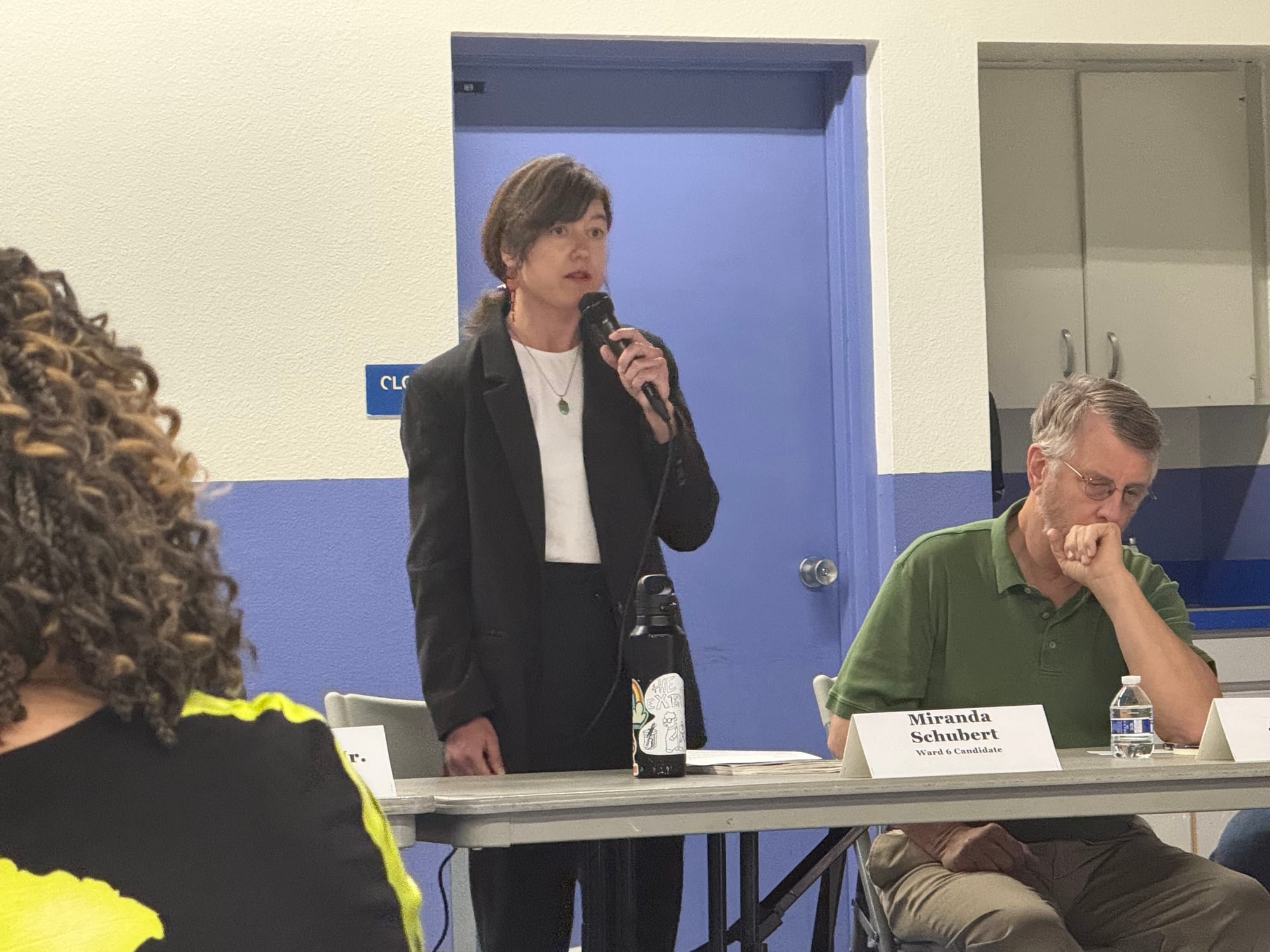
Accessibility and office hours
Tolkoff said he wants to extend office hours to what they were before COVID-19 and allow the offices to stay open outside normal business hours so more community members who work during the day can come in.
“What if your city council started at 12 p.m. and ended at 8 p.m. so that those who work could actually have access?” Sinex asked, echoing Tolkoff’s sentiments. “It also comes down to scheduling and a determination to make sure that you’re available so that people can talk to you.”
Barajas said many people she’s spoken to while canvassing didn’t know what a ward office was or who the current Ward 5 representative is.
“Right now what I’m going to be doing is really reintroducing our constituents to the ward office,” she said. “I belong to [Barrio Santaria] neighborhood association, one of a handful of associations in Ward 5 that are fairly active.”
She said that prior to longtime Ward 5 Council Member Richard Fimbres’ retirement earlier this month, her association had been unsuccessful in securing a meeting.
“I would make sure to be present and available not just to our association but to a lot of our local leaders and organizations,” she said.
Dahl defended his current office hours, which run from 9 a.m. to 1 p.m., explaining that while walk-ins can be helpful, his team is often available at other times by appointment or via email.
He said email communication can sometimes be more effective, as it allows constituents to include photos or detailed descriptions of an issue, helping staff respond more efficiently and accurately.
Ward 3 opponent Shaw countered his statement, saying she’s heard from many constituents who say the office hours are not accessible.
“The 9 a.m. to 1 p.m. hours are something that I will certainly change if elected,” she said, supporting Sinex’s proposed office hours of 12 to 8 p.m. and suggesting a standard 9-to-5 schedule as an alternative.
The League of Women Voters of Greater Tucson is hosting candidate forums for individual wards over the next few weeks.
Tucson Spotlight and Arizona Luminaria are also hosting a candidate meet-and-greet at the Community Foundation for Southern Arizona campus on July 8. Find details and RSVP here.
Sarah Arellano is a journalism major at the University of Arizona and Tucson Spotlight intern. Contact her at saraharellano@arizona.edu.
Tucson Spotlight is a community-based newsroom that provides paid opportunities for students and rising journalists in Southern Arizona. Please support our work with a paid subscription.

